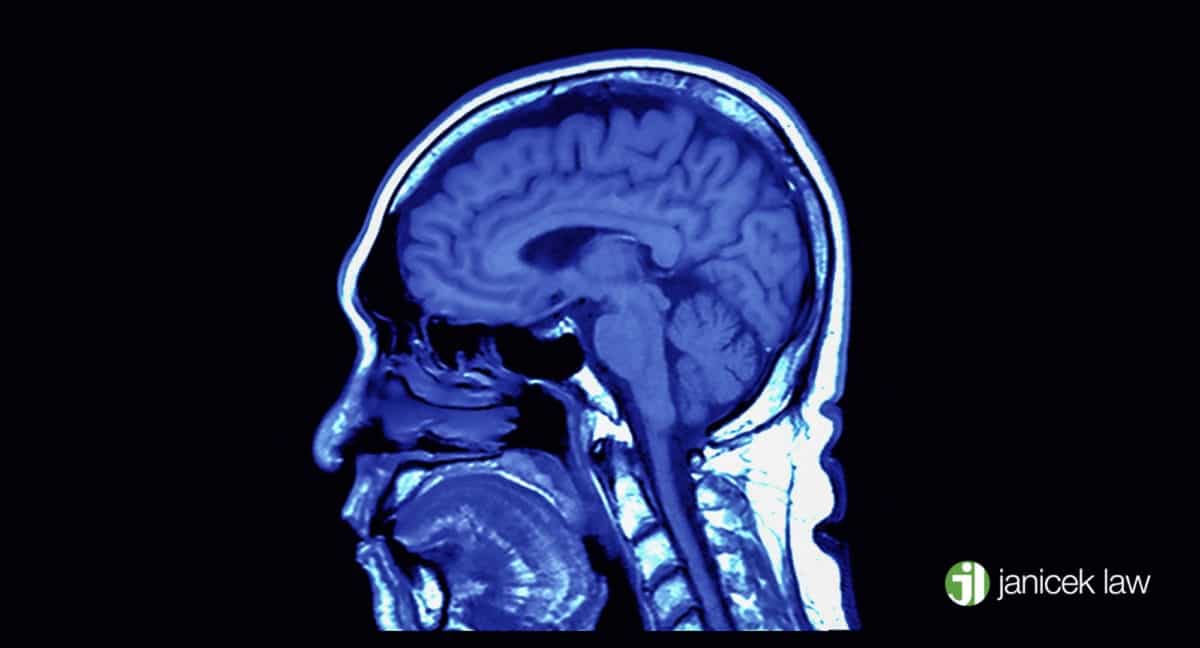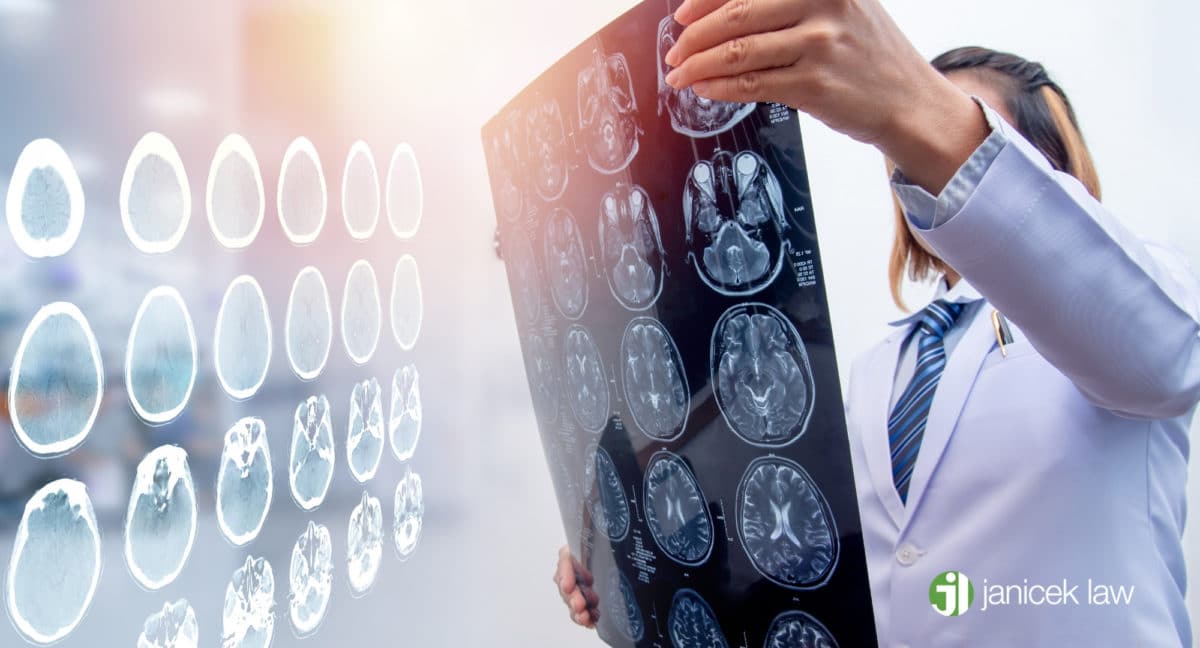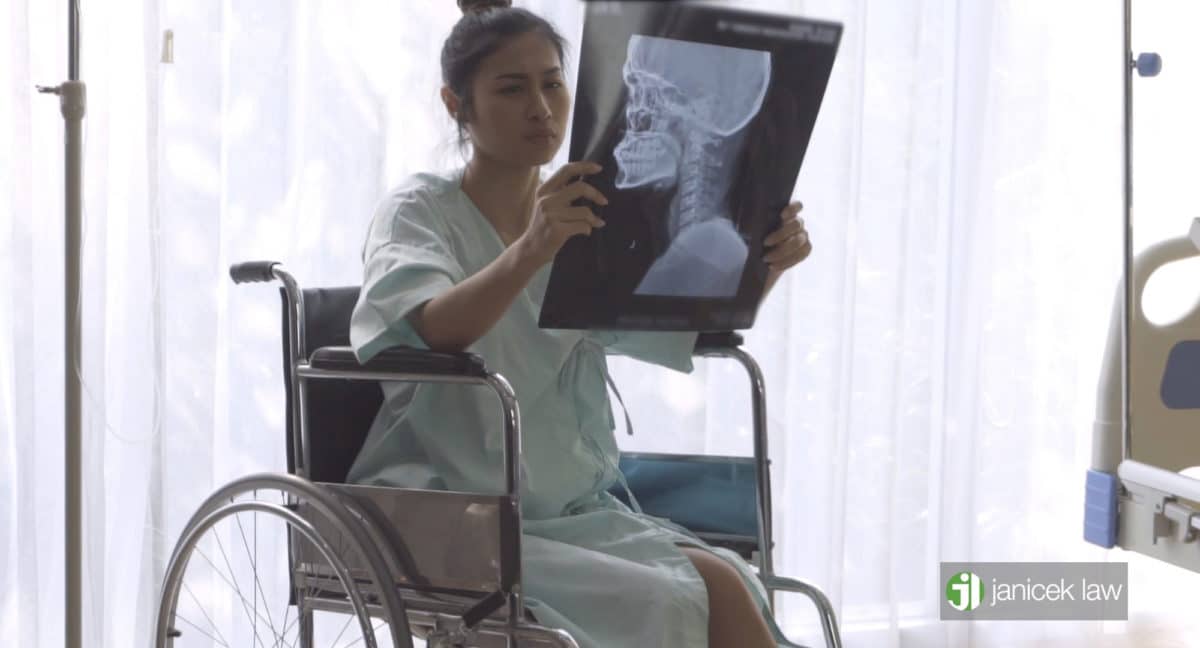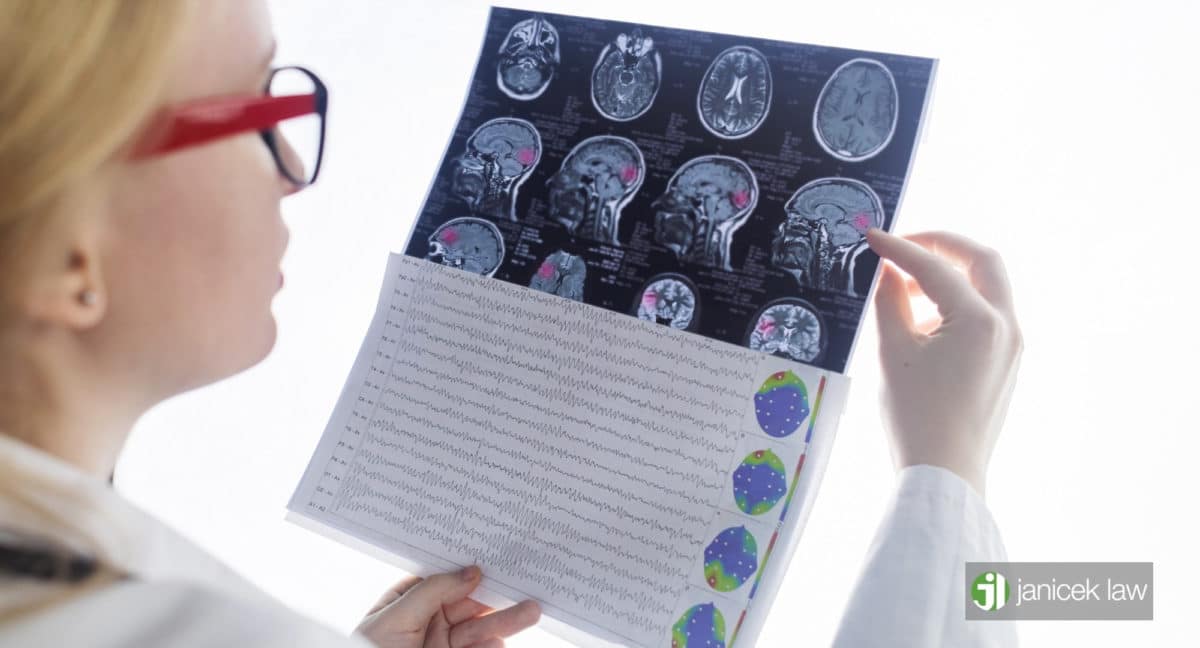Traumatic Brain Injury Attorney
Traumatic Brain Injury Attorney in San Antonio
In terms of a brain injury lawsuit, traumatic brain injury victims, or brain injury association, a head injury lawyer should handle any personal injury case with sensitivity. Our San Antonio legal team is proficient in both mild traumatic brain injury cases and cases involving severe traumatic brain injuries.
The trusted head injury lawyers at Janicek Law understand the challenges you and your loved ones face when caring for a family member with a traumatic brain injury, as individuals facing a severe TBI can often need 24/7 medical attention.
On a separate note, the bank-breaking medical costs associated with a brain injury can quickly become overwhelming.
Our lawyers know what it takes to recover compensation in a personal injury case. If you or someone you know was involved in a car accident, motor vehicle accident, explosion, or any other negligent acts that led to a TBI, call 210-366-4949 today for a free consultation.
Obtaining a skilled traumatic brain injury attorney is of the utmost importance. At Janicek Law, we will fight to protect your loved ones and adequately represent the facts surrounding their unique traumatic brain injury claim. Our brain injury attorneys work tirelessly to ensure that the negligent party compensates your family for the medical expenses and medical bills resulting from their negligence. Whether you need legal services from an experienced traumatic brain injury lawyer or if you just have a few questions, the attorneys at Janicek Law know how to help. When you partner with the head injury attorneys at Janicek in San Antonio, you secure a trusted law firm and gain a loyal friend.

What is a Traumatic Brain Injury (TBI)?
In the simplest definition, a traumatic brain injury, commonly called TBI, is an injury that affects the way a person’s brain operates. Traumatic brain injuries can stem from a bump, jolt, or blow to the head or a penetrating injury, such as a gunshot wound to the skull.
Traumatic brain injuries can vary in severity from a mild TBI or concussion to a moderate or more severe TBI.
Head and brain injuries are a significant cause of disability and death in the United States. In 2020 alone, over 64,000 TBI-related deaths occurred in the United States.
One of the key aspects of a traumatic brain injury is the change that occurs within the brain. Trauma changes brain function or alters brain pathology. During the trauma, in many cases, the brain forcefully collides with the skull. This may cause swelling, bleeding, and bruising of the axons.
Traumatic brain injuries are categorized as open (penetrating) or closed (non-penetrating) and can have wide-ranging physical and psychological effects.
Some symptoms or signs of head injuries can appear right after the traumatic accident, while other head traumas may occur weeks or even years later.
Common Types of Brain Injuries
The most common types of traumatic brain injuries include the following:
- Concussions
- Brain hemorrhages
- Intracranial hematomas
- Diffuse axonal injury
- Penetrating brain injury
Traumatic Brain Injury Symptoms
Since there is a wide range of traumatic brain injuries, the symptoms vary greatly in terms of both physical and psychological effects. Some symptoms may show immediately following the accident, while others may appear days or even weeks later.
An individual who suffers from a mild traumatic brain injury may suffer from several debilitating symptoms. It is important to note that even a mild traumatic brain injury requires medical attention. Anyone who receives any type of blow to the head or body that causes behavioral differences should seek immediate medical care.
The symptoms of mild traumatic brain injuries could result in sensory differences, like loss of taste or even a bad taste, loss of smell, nausea, vomiting, fatigue or dizziness, etc. If you have suffered a head injury and experienced the following symptoms, you may need to seek medical guidance from a doctor.
Symptoms associated with a mild TBI or concussion include:
Physical Symptoms
- Nausea
- Headache
- Fatigue
- Drowsiness
- Dizziness
- Problems with speech
Behavioral or Mental Symptoms
- Difficulty sleeping or sleeping more than usual
- Loss of consciousness, not lasting more than a few minutes
- Mood swings
- Depression
- Loss of memory
- Difficulty concentrating
Sensory Symptoms
- Sensitivity to light and/or sound
- Blurred vision
- Bad taste in the mouth
- Ears ringing
When a person has a severe traumatic brain injury, the symptoms could range drastically depending on the factors surrounding the accident itself, as well as the individual’s physical attributes. Some may experience memory loss, trouble learning, understanding, or even speaking. The injury can also affect an individual's strength and balance in the arms and legs. As for a person's behavioral changes, moderate to severe cases of TBI have been known to cause depression.
Those who have sustained a moderate to severe TBI can present with symptoms similar to a mild TBI, as well as the following:
Physical Symptoms
- Loss of coordination
- Numbness in fingers and/or toes
- Loss of consciousness, up to several hours
- Seizures
- Vomiting or nausea
- Fluids draining from ears or nose
- Dilation of one or both pupils
Behavioral or Mental Symptoms
- Coma
- Confusion
- Slurred speech
- Agitation
Babies or younger children will not be able to communicate any sensory issues, headaches, confusion, or other symptoms. So, as a parent or caretaker, you must look for secondary symptoms when you suspect the child may have a head injury.
Infants or children with TBI may present with the following symptoms:
- Irritability
- Changes in eating habits
- Inability to be consoled
- Seizures
- Drowsiness
- Change in sleep habits
- Loss of interest in activities or toys
If you see a person in a confused state, showing agitation or other unusual behavior, including emotional distress, using slurred speech, or they lose consciousness, you should help them seek immediate medical care.
Physical trauma from head injuries inflicted by car accidents, motor vehicle accidents, or even sports injuries can all lead to a traumatic brain injury. For this reason, we urge those who have been involved in any type of accident to seek medical attention immediately. Once the injured person is stable, the head injury lawyers at Janicek will provide the help and legal representation your family deserves.
While traumatic brain injuries can cause an array of physical and mental symptoms, they create other outside hurdles for family members and loved ones. The San Antonio traumatic brain injury lawyers at Janicek Law know the suffering and lost wages that can result from a TBI caused by someone else’s negligence. Janicek’s experienced traumatic brain injury attorneys will provide you with compassionate and professional legal representation for your brain injury case
During your free consultation, we will discuss your brain injury claim and the helpful facts that support your case through Texas brain injury law. We understand that medical bills and medical treatments can be costly in brain injury cases, and we want to help recover adequate compensation for your loved ones.

Common Causes of Traumatic Brain Injuries
Traumatic brain injuries are often a result of a blow to the head or an accident that causes the head to shift forward too quickly. The level of damage can depend on several things, especially when it comes to the nature of the injury and the force of impact.
The most common causes of traumatic brain injuries include:
- Sports Injuries: Those who participate in high-impact sports, such as boxing, football, or lacrosse, often sustain TBIs after being hit. Higher-level cheerleaders can sustain injuries while tumbling or stunting on astroturf. Cyclists who fail to use their helmets correctly are also at a higher risk of sustaining head injuries.
- Slipping and Falling: For older adults especially, slipping and falling poses a great risk. Accidents ranging from slipping in the bathroom to falling down the stairs can all cause traumatic brain injuries. Younger children or babies who fall off the bed onto a hard surface, such as tile, are also at risk of sustaining a head injury.
- Vehicle or Motor-Related Collisions: Collisions that involve bicycles, cars, motorcycles, or pedestrians are another common cause of a traumatic brain injury.
- Violence: Cases of domestic violence, wounds from gunshots, and other assaults are common causes of a traumatic brain injury.
- Explosive Blasts: Any blast or explosion can cause traumatic brain injury. Those who are repeatedly exposed to explosions, whether controlled or uncontrolled, are at a higher risk of sustaining a TBI. Head injuries are especially common for military personnel.
There are many causes for the diagnosis of TBI. Injuries could occur without even detecting any traumatic brain injury. If involved in an accident, it is imperative to seek medical attention to ensure you are in good health to prevent further damage to your potential condition.
Long-Term Effects of a Traumatic Brain Injury
The long-term effects of a traumatic brain injury can be significant for an individual. For starters, the life expectancy for an individual who suffers a penetrating head injury is 9 years less than the average person without a TBI. It is also important to remember that life expectancy decreases even more when dealing with TBI cases involving seizures and infections.
About 33% of traumatic brain-injured patients require around-the-clock help with medical treatment and medical care. Serious brain injury cases could require more assistance depending on the injury itself. Rehabilitation services are offered for those who are able to recover from a traumatic head injury or closed head injury.
How to Prove Negligence in a Traumatic Brain Injury Lawsuit
The fundamental principle in personal injury law is that those who are injured as a result of the negligence of others are entitled to recover the losses they sustain as a result of that negligence.
Head or traumatic brain injuries typically result in significant losses to both the injured party, as well as their family, who must often make sacrifices to care for their loved one. However, in order to recover these damages, the injured victim must establish that the accident that caused the injuries was a result of negligence.
Put simply, negligence occurs when someone fails to act with a degree of care that a reasonable person would exercise in the same situation.
To establish negligence, the claimant must show that the:
- Defendant owed a duty of care to the injured party.
- Defendant breached that duty with their action or inaction.
- Plaintiff suffered an injury.
- Defendant’s breach of duty is what caused that injury.
Physical complications can occur at any time after a personal injury, especially when involving a head injury. The potential complications may be a direct influence by the injury itself or other factors.
Although medical experts will do their best to provide proper medical treatment for any patient who presents brain damage in a hospital setting, there are many areas for complications.
Brain injury complications can vary, especially depending on the impact and placement of the injury.
For example, when a person has an open head injury, this should always be treated as a delicate matter to prevent infections. Medical professionals will need to implement the proper disease control for all patients
Many individuals also develop seizures, potential fluid build-up in the brain, blood clots or blood vessel damage, headaches, dizziness, and or vertigo.
Anyone facing mild, moderate, or severe head injuries is at risk of developing complications. At Janicek Law, our brain injury attorneys will provide the additional legal support and guidance your family needs during this difficult time, in the event that you wish to move forward with a brain injury lawsuit.
All head injuries have the potential of causing changes to an individual's emotional or behavioral state. A person may have behavioral or emotional issues that stem from a traumatic brain injury. TBI patients can potentially suffer from chronic, anxiety, depression, and PTSD. Some sufferers can also become violent or aggressive.
An individual may also lack various levels of social skills. For example, the behavior presented by a person with a TBI may be rude or come off as being irritable. In some instances, a person can even become dangerous to themselves or others. Having the proper medical experts to support and treat a serious head injury is imperative to an individual's recovery and well-being.
The attorneys at Janicek Law will work with you and your loved ones through the emotional distress that comes as a result of sustaining an injury, such as head trauma. We understand the medical care you deserve and need after sustaining a serious brain injury.

Types of Damages for Traumatic Brain Injuries
One of the more common questions we answer is, “How much is a brain injury case worth?”
Our San Antonio brain injury attorneys understand that a TBI is one of the most devastating injuries that one can sustain.
The brain injury may come with a permanent disability or loss of function, permanent personality changes, and permanent inability to work. So, we’re slow to throw out numbers in terms of traumatic brain injury settlements, as each case is drastically different. Each case is fact-specific and depends on a multitude of factors, including the type of injury sustained, the treatment received, any future care that will be necessary, the damages for the individual case, the characteristics of the plaintiff, and the list goes on.
As a general rule, mild concussions will have a lower settlement value than severe brain injuries.
For example, say that a vehicle accident causes head injuries to an individual that lead to an axonal injury. This type of injury could mean much more than just lost wages and medical bills for the injured person. An individual who suffers from diffuse axonal injuries could lose their lives. Statistics show that 90% of diffuse axonal injuries will remain in a state of unconsciousness. As for the other 10% that do regain consciousness, they often face several challenging disabilities.
Victims who sustain axonal injuries require more in damages, as their life will never return to the way it was before the injury.
For all personal injury cases, damages are divided into two categories: economic and non-economic damages.
Economic Damages in a TBI Lawsuit
The economic damages associated with a traumatic brain injury lawsuit can include:
- Medical expenses
- Medication expenses
- Physical therapy expenses
- Assisted living expenses
- Lost wages or reduced earning capacity
- Property damage, vehicle repairs, or replacement
Non-Economic Damages in a TBI Lawsuit
Non-economic damages are more difficult to calculate. They serve more as a multiplier for the economic damages awarded in a personal injury case.
These damages can include:
- Mental anguish
- Pain and suffering
- Loss of enjoyment of life
- Wrongful death
- Loss of consortium
Punitive Damages
In the great state of Texas, injured victims are able to push for punitive damages. These damages are only awarded when the defendant acted in gross negligence, as a way to further deter the defendant from repeating the action or inaction that lead to the injury.
However, statutory caps on punitive damages do exist for personal injury claims.
The punitive damages may not exceed the amount equal to the greater of:
- $200,000, or
- Two times the amount of economic damages, plus the amount equal to any noneconomic damages, but not exceeding $750,000

Call a San Antonio Traumatic Brain Injury Attorney Today
Seeing a family member or loved one suffer from a TBI can leave any family feeling lost or without hope. Oftentimes, when dealing with a traumatic brain injury case, an injured individual and their family will benefit simply from speaking with an experienced traumatic brain injury attorney. Let our knowledgeable San Antonio brain injury lawyers guide you through the steps and support your family during this challenging time.
For those assisting loved ones who have sustained brain trauma stemming from a car accident or motor vehicle accident especially, please contact our office because you may have a claim. We understand that going the extra mile for our clients suffering from a traumatic brain injury is our duty as personal injury lawyers. Call our experienced traumatic brain injury lawyers today at 210-366-4949.
